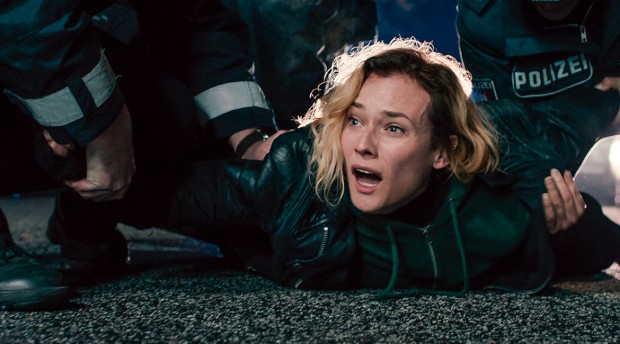
IN THE FADE
Magnolia Pictures
Director: Fatih Akin
Written by: Fatih Akin, Hark Boh,
Cast: Diane Kruger, Denis Moschitto, Johannes Krisch, Samia Chancrin, Numan Acar
Screened at: Review 1, NYC, 11/18/17
Opens: December 27, 2017
Now that right-wing parties are arising, the stage is set for the movie industry to capitalize on the dangers we face from people who are out to harm us. Countries in Europe with sizable minorities targeted by violent fascist groups, disgusted with the presence of people practicing different cultures from the majority. With “In the Fade,” Fatih Akin, born in Hamburg of Turkish roots, deals with the storm already in play, covering what he knows– having contributed films like “Goodbye Berlin.” This time Akin is on the money with a political thriller which could thrust Diane Kruger to the top of the heap during awards season when “Best Actress” need not be one performing in an American movie.
In a film that accepts some of the tropes of American thrillers but gives a more nuanced portrayal here, we see that Katja (Diane Kruger) is not the “good guy” determined to avenge a killing by the “bad guys.” She herself lives outside the norms of femininity. Her body is increasingly submerged in tattoos. She does recreational drugs. She smokes fiercely and without apology. She marries an outsider, a Kurdish man who is even more flawed in that he deals drugs in the university where Katja meets him. Katja, a full-bloodied German marries a man who is not only from Turkey but a prisoner “hosted” by the German government. When her husband Nuri (Numan Acar) is released from jail to the cheers of his fellows, he opens a travel agency/tax advice office and, when he becomes a father to Rocco (Rafael Santana), he gives up drugs completely and becomes a terrific husband.
As though good things can’t last, he and his son are murdered by a bomb left on a bicycle outside the shop in the Turkish section of Hamburg. A police investigation seems to be more interested in probing Katja’s character, particularly since she has been devastated so greatly by the murders that she indulges in hard drugs supplied to her by her lawyer, Danilo Fava (Denis Moschitto).
A large segment of the movie takes place in a Hamburg courtroom, in which we Americans will note the differences we have with German law. Edda Möller (Hanna Hilsdorf), a suspect has been arrested, leading to a trial with a verdict to be determined by five judges, no jury. There are no lawyers bouncing up and down with objections. The procedure is more informal. Katja is called not simply a victim but a co-plaintiff, determined along with her friendly lawyer Danilo to convict the Nazi woman suspected of leaving her bicycle outside the travel agency.
Not only does this film proceed at a breakneck pace: Diane Kruger, who in the past has shown complete proficiency with the English language, is now free to spew her righteous venom at the accused with such determination that we wonder whether the suspect would ever be free even if found not guilty. Rainer Klausmann films in Hamburg and Greece, the latter country used because, we learn, that the German Nazis (they’re not called neo-Nazis as they are called here) are in cahoots with the Nazi ideologues in Greece. Kruger’s acting is so convincing that we barely need Joshua Homme’s dazzling score to up the ante. This is a film torn from today’s headlines and executed with such fervor that we in our seats may well feel light jumping through the screen to strangle the killer.
Unrated. 115 minutes. © Harvey Karten, Member, New York Film Critics Online
Comments, readers? Agree? Disagree? Why?
Story – A-
Acting – A-
Technical – A-
Overall A-





